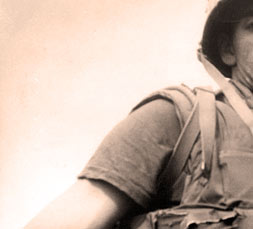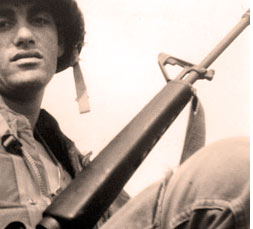|
 |
 |
 |
|||
|
Casualties of War
Minneapolis City Pages, September 14, 2005 Two documentaries, two wars, 30 years apart. One man's pale cheeks are covered in thickets of sideburns, the other's are brown and clean-shaven. But the words of the first soldier neatly sum up the frustrations of the second: "The man on the street [in the U.S.] is too busy making a buck, he's too worried about getting antifreeze for his car.... They all know what's happening, but it's like nothing's happening." Michael Tucker's Gunner Palace, which opened earlier this year, sharply conveys the U.S. soldier's sense of being forgotten, even abandoned, in Iraq by Americans (and American media) expecting timely victory. Winter Soldier, a 1972 documentary being re-released by Milliarium Zero, addresses that same willful myopia in broader terms. It wasn't that Americans in the early '70s didn't want to hear about Vietnam anymore; they didn't want to know what war was like for the soldier—how grief turns vengeful, how nationalism and racism dehumanize enemies and civilians alike, how terrible acts become commonplace, how the mind hides its own horror from itself. In retrospect, the 2005 public thirst for distraction from Iraq (pre-Katrina) may have been less about "war fatigue" than about Abu Ghraib—a held-nose avoidance of that smelly mess that the dog kept dragging in. Shot in four days by the dozen members of the Winterfilm Collective (including Barbara Kopple and Robert Fiore), Winter Soldier stems from a 1971 convocation in Detroit sponsored by Vietnam Veterans Against the War. Former soldiers arrived from across the country to testify in the Winter Soldier Investigation as to what they'd done and seen in Vietnam. In the national news was the trial of Lt. William Calley, second officer in charge during the 1968 My Lai civilian massacre. An army photographer's pictures of the grisly scene ended up in Life magazine, and a disturbed nation wanted someone punished. My Lai was seen—and spun—as an aberration; the Winter Soldier Investigation was meant to show otherwise. Unfortunately, though the testimony was entered into the Congressional Record, no one much cared, and this documentary was barely screened. Winter Soldier begins with VVAW organizers interviewing the arriving vets. The camera briefly catches John Kerry asking a former soldier why he came to Detroit, and that's the last seen of him. Instead, there's a curly-headed blond man, angelic and beautiful, describing Vietnamese prisoners bound with copper wire (over their eyes) and tossed out of helicopters in contests. Another man remembers 291 villagers—"women, children, everything"—deliberately sandwiched between companies and mowed down. "I didn't like being an animal," notes the man with sideburns, "and I didn't like seeing everybody else turning into animals." The testimony moves into a public space, with audience and microphones. The men speak of children shot for fun, women raped, prisoners killed, bodies desecrated—as a matter of course, as daily activity. Brown and white, the men are by turns earnest, angry, emotionless, laughing in horror. One man won't let his ugly story go, returning to the facts as if they should be unbelievable, as if words should not be able to represent such things. Yet in this context, it's not even the worst story. The danger of such an atrocity exhibition is that the bodies remain bodies, things used and discarded even in remembrance. The filmmakers, if not the VVAW organizers, were aware of that risk; early on, the Winterfilm Collective interrupts the public testimony footage with scenes of veterans examining the context of their behavior. "It wasn't like they were humans," one bluntly states of the Vietnamese. "We were Americans, the civilized people—we didn't give a shit about these people." The film focuses cannily on those who entered the war as believers in both the conflict and the higher purposes of the United States. Their language—of military conditioning and nationalistic brainwashing—may be dated now, but the pain of their betrayal still looks raw. They didn't grow up cynical on M*A*S*H and Watergate and the distant failures of Vietnam, and they weren't accustomed to anyone using them like dogs. Of course, other (nonwhite) Americans were used to such treatment, and the film interrupts itself again to document an audience member's impromptu teach-in on racism. Among the various explanations for civilian and prisoner maltreatment, the race of the enemy and the noncombatants isn't mentioned—except in code: "The Vietnamese were 'gooks.'" The protester insists, "If you want [this investigation] to be real, you've got to ask, 'Why?'"—the "why" behind (or concomitant with) nationalism and imperialism. Another black vet later sketches the misery of feeling both a kinship with the Vietnamese and a survivalist's instinct to shoot anything that moves. It was around here that this viewer began to see the Vietnamese in the pictures not as examples of United States victimization, but as people: kin. And feeling that, while listening to these repentant voices, is almost unbearable. (A woman holds a bloodied baby; American bombs and bullets are killing babies, children in Iraq right now.) The argument we heard about Abu Ghraib—that the other side does worse things—has no bearing among men who cannot square what they believe in with what they participated in doing, if only by not stopping it. Some can hardly speak for the emotion. Some speak eloquently but breezily—and later admit they shut down in fear of crying. The last, meditative section of Winter Soldier focuses on three white men beginning to have some thoughts about the damaging construct of masculinity. It's an important point, and the men are so scared to talk about it that I wanted to reach out over three decades of contested masculinity and kiss them. But it's a shame the filmmakers let go of the thread thrust upon them by the black protester. The ending leaves the impression that minorities have nothing to say about gender, nor whites about race, that this is a film not about people coming to political and moral consciousness, but about white American guys trying to forgive themselves. And who has time for that story now? |
MORE REVIEWS
Movie review: 'Winter Soldier'
Eat the Document
Film Echoes the Present in Atrocities of the Past |
||||
|
|||||